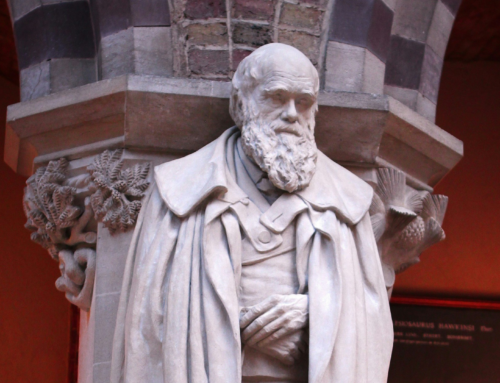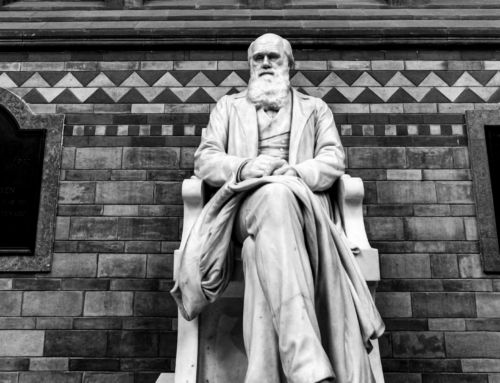Could monkeys type one line of a Shakespearean play? It’s an interesting question for sure, and actually plays an important role in our understanding of the probability of the evolutionary process. If you’re wondering how those two things relate, you’ll definitely want to check out this week’s Creation Today Show  with one of our partners, engineer Jim Hoff!
with one of our partners, engineer Jim Hoff!
This show has so much science and math, but it’s incredible and Mr. Hoff makes it relatively simple to understand. But I found a great article that explains the experiment we conducted. So strap in and get ready for a great read! Thank you to Larry Marshall for this great article that you can find here.
“Within any given alphabet of x possible characters (where each character has an equal chance of occurring), the probability of any one of the characters occurring is 1 chance in x. For instance, if a monkey could bang randomly on a simplified typewriter possessing only keys for the 26 English letters, and assuming he was a perfectly random little monkey, there would be 1 chance in 26 that he would hit any particular letter at any particular moment.
The ‘famous’ atheist Richard Dawkins wrote “I don’t know who first pointed out that, given enough time, a monkey bashing away at random on a typewriter could produce all the works of Shakespeare.” The idea originated with French mathematician Émile Borel, who pointed out in 1913 how unlikely it would be that a million monkeys typing ten hours a day would produce exactly all the books in the world’s libraries. Borel used this to illustrate the extreme unlikelihood of certain events, but Darwinists such as Dawkins now use the image of typing monkeys to illustrate the opposite: the likelihood that random processes can produce information. According to the “infinite monkey theorem,” an infinite number of typing monkeys (or a finite number of monkeys typing for an infinite time) will eventually produce the works of William Shakespeare.
In theory, an infinite number of monkeys with an infinite amount of time would write the works of Shakespeare—mixed in with an infinite amount of utter nonsense. But the real world isn’t infinite. On July 1, 2003, a Monkey Shakespeare Simulator was posted on the Internet.
 The simulator does not use real monkeys, of course; it is a computerized random letter generator in which each “monkey” types one letter per second and the number of monkeys is continually increasing. The simulator compares its output with the works of Shakespeare and reports matches—though it waits for such matches to appear on their own instead of selecting for a target sequence, as Dawkins’ did in a simplified program he wrote. After a year and a half, the longest match produced by the Monkey Shakespeare Simulator was twenty-four letters from a line in The Second Part of King Henry IV, which took the equivalent of 2,738 trillion trillion trillion monkey-years to produce. (A year later, the record had been extended to over thirty letters, which took trillions and trillions more monkey-years to produce.)
The simulator does not use real monkeys, of course; it is a computerized random letter generator in which each “monkey” types one letter per second and the number of monkeys is continually increasing. The simulator compares its output with the works of Shakespeare and reports matches—though it waits for such matches to appear on their own instead of selecting for a target sequence, as Dawkins’ did in a simplified program he wrote. After a year and a half, the longest match produced by the Monkey Shakespeare Simulator was twenty-four letters from a line in The Second Part of King Henry IV, which took the equivalent of 2,738 trillion trillion trillion monkey-years to produce. (A year later, the record had been extended to over thirty letters, which took trillions and trillions more monkey-years to produce.)
The poster believes that along about say 1,502 trillion, trillion 768 billion, 532 million, 456 thousand two hundred and one time a monkey actually typed something worthy of Shakespeare and the rest since then has been useless typing. If you want to believe that, then please get in touch with me, I have some sea front property in Yuma, AZ I would like to sell.
I believe I have shown that not only is it IMPOSSIBLE for the monkeys to type anything remotely similar to a Shakespeare sonnet, it is also completely IMPROBABLE. However, one can always hope that anything is possible…
Or let us take another approach: This has a somewhat comical appeal to me, is that of a blind monkey typing. Suppose that, instead of 26 letters plus spaces and punctuation in our English alphabet, there are only 20 possible choices for the monkey for each keystroke. We’ll use 20 because that’s the number of different kinds of amino acids our cells link together to make proteins (for now, we’ll ignore substitutions of amino acids; the math is so overpowering it works either way, and some proteins allow little or no substitution). We can compare the odds of a monkey accidentally typing a specified sequence of letters with the odds of the accidental formation of a specified sequence of amino acids.
Here’s a line from Shakespeare: “What fools these mortals be.” It has a total of 27 letters/spaces. How likely is it that a monkey will accidentally type this exact sequence? Again, we assume the monkey has a choice of exactly 20 letters/ spaces for each keystroke and is equally likely to type, completely at random, any particular letter/ space in any position. Of course, our blind monkey could get lucky and type this exact sequence the very first time. But what are the odds?
 Because there are 27 letters/spaces, the number of possible sequences of this length is 2027, or about 1035. The number of seconds in the history of the universe, since the big bang, is about 4 × 1017. So, even if we have a billion (109) quick-typing monkeys, who type the entire 27 characters every single second since the beginning of the universe (obviously this is fanciful, the monkeys couldn’t have existed at the beginning of the universe, but we are just trying to get a sense of the magnitude of the problem), we “only” get a total of 4 × 1026 sequences, and the chance that any of these monkeys ever typed “what fools these mortals be” is about 1 in 250 million (because 1035 is about 250 million times bigger than 4 × 1026).
Because there are 27 letters/spaces, the number of possible sequences of this length is 2027, or about 1035. The number of seconds in the history of the universe, since the big bang, is about 4 × 1017. So, even if we have a billion (109) quick-typing monkeys, who type the entire 27 characters every single second since the beginning of the universe (obviously this is fanciful, the monkeys couldn’t have existed at the beginning of the universe, but we are just trying to get a sense of the magnitude of the problem), we “only” get a total of 4 × 1026 sequences, and the chance that any of these monkeys ever typed “what fools these mortals be” is about 1 in 250 million (because 1035 is about 250 million times bigger than 4 × 1026).
So the odds of accidentally forming a precise sequence of 27 amino acids are laughingly small. Let’s now expand our imaginations to assume that every star in the universe has a planet with 1 billion monkeys typing. If we use a large estimate for the number of stars in the universe, we can expect that one of these monkeys will type “what fools these mortals be” within about 10 seconds.
But that’s just the beginning of complexity. Now let’s estimate the odds of accidentally creating a specified string of 75 amino acids. There are 75 letter/ spaces in “What a piece of work is a man how noble in reason how infinite in faculties.” There are a total of 2075 or about 4 × 1097 amino acid sequences of this length. Suppose, instead of a mere billion monkeys, each star in the universe has a planet with a billion billion billion billion monkeys, or 1036 monkeys, and each monkey can type even this 75 letters/ spaces sequence in just 1 second, to keep it simple. OK, maybe too much math, definitely too many monkeys, but the likelihood of any of these blind monkeys ever typing our specified sequence in a time equal to the history of the universe is less than 1 in 1019, or less than one part in ten billion billion. So the odds of forming a single, relatively short specified protein with 75 amino acids by accident are vanishingly small, regardless of how many stars with Earth-like planets may exist. We are beyond laughingly small to pretty darn ridiculous.
Don’t tell me amino acids can be created by accident. Don’t tell me about “billions and billions” of years for life to arise. Don’t tell me about “countless” stars and planets in the universe. It all doesn’t matter. Using simple concepts of number— exponents— one can expose as false claims that life arose by accident.
Case made. And then you have to worry about the possibility of amino acids gathering together into polypeptides and then proteins.
I promised to give you counterarguments, and here is one from Richard Dawkins and Stephen Jay Gould, among others. They say it is “false” that Darwin’s theory rests on chance alone; they say it works by “cumulative selection.” Say you start with a piece of gibberish and you want to transform it into meaningful text— you want to transform gibberish into “what fools these mortals be.” You give the gibberish a spin— you randomly change letters, or mutate the DNA code in the world of life— and some of the resulting English letters/DNA letters may be correct. Not many, but perhaps one or maybe more. You hold on to any that are correct. You give the remaining English letters/DNA letters a second spin/mutation, and perhaps you get another one or more that are correct, and now you hold on to those also. You keep doing this. This process will converge in a reasonable period of time to yield the English phrase, or the DNA code, you are looking for.
or mutate the DNA code in the world of life— and some of the resulting English letters/DNA letters may be correct. Not many, but perhaps one or maybe more. You hold on to any that are correct. You give the remaining English letters/DNA letters a second spin/mutation, and perhaps you get another one or more that are correct, and now you hold on to those also. You keep doing this. This process will converge in a reasonable period of time to yield the English phrase, or the DNA code, you are looking for.
Dawkins and many others, with umpteen degrees and peer-reviewed articles to their credit, claim this “cumulative selection” drives Darwinian evolution. To which I meekly respond, in the words of the great John McEnroe: “YOU CANNOT BE SERIOUS!” How does the gene know what it is looking for? How does it “cumulatively select” good letters and keep mutating only the bad letters? You get a designed product, and we’re not supposed to notice the wizard behind the curtain running the show? You sneak intelligence in the back door but still claim the process is “natural”? So to Dawkins and many others, “cumulative selection” works like this. You have an ordinary gene (let’s call him “Joe”) just sitting there, hiding out in the DNA, minding his own business. Not a lot happens in the genome. Sure there’s replication, but the error rate on that is only one letter in a billion.
But one day there is a mistake, and a DNA letter is changed by accident. Joe says, “Hey, that feels good, I might be able to use that someday” and decides to hang onto that change for future generations. It’s a slow process, but Joe is patient. Sure enough, just 125,314 generations later, somehow, inexplicably, a string of DNA letters from Joe’s buddy Hal gets inserted by accident when Joe is being replicated, and Joe says, “You know, that feels good too. I’ve got a hunch I might be able to use those extra letters someday, particularly if another 27 changes are made in just the right spots in my DNA code.” Well what do you know, but it all works out perfect for Joe in just 72,437,197 more generations.
Reality is a far cry from possibility.”






